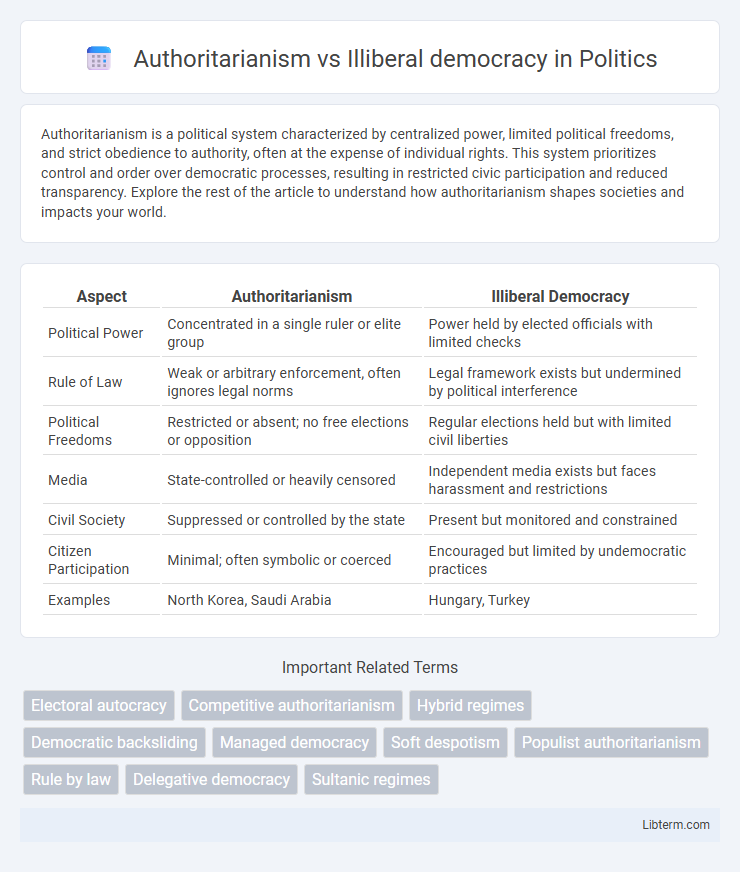Authoritarianism is a political system characterized by centralized power, limited political freedoms, and strict obedience to authority, often at the expense of individual rights. This system prioritizes control and order over democratic processes, resulting in restricted civic participation and reduced transparency. Explore the rest of the article to understand how authoritarianism shapes societies and impacts your world.
Table of Comparison
| Aspect | Authoritarianism | Illiberal Democracy |
|---|---|---|
| Political Power | Concentrated in a single ruler or elite group | Power held by elected officials with limited checks |
| Rule of Law | Weak or arbitrary enforcement, often ignores legal norms | Legal framework exists but undermined by political interference |
| Political Freedoms | Restricted or absent; no free elections or opposition | Regular elections held but with limited civil liberties |
| Media | State-controlled or heavily censored | Independent media exists but faces harassment and restrictions |
| Civil Society | Suppressed or controlled by the state | Present but monitored and constrained |
| Citizen Participation | Minimal; often symbolic or coerced | Encouraged but limited by undemocratic practices |
| Examples | North Korea, Saudi Arabia | Hungary, Turkey |
Defining Authoritarianism
Authoritarianism is defined by concentrated power in a single ruler or a small elite, characterized by limited political pluralism and constrained individual freedoms. Unlike illiberal democracy, which maintains electoral processes but weakens the rule of law and civil liberties, authoritarian regimes often suppress dissent through coercive means and lack genuine political competition. Key features include centralized control, restricted media, and the absence of transparent governance, ensuring that power remains unchallenged.
What is Illiberal Democracy?
Illiberal democracy is a governance system where elections occur but civil liberties, rule of law, and checks on executive power are weak or undermined. Unlike authoritarianism, illiberal democracies maintain some democratic institutions but restrict political pluralism, media freedom, and judicial independence, limiting genuine democratic accountability. Countries like Hungary and Turkey exhibit illiberal democratic traits, blending electoral legitimacy with democratic backsliding.
Key Differences Between Authoritarianism and Illiberal Democracy
Authoritarianism is characterized by concentrated power in a single leader or ruling party with limited political freedoms and little to no competition, whereas illiberal democracy features regular elections but lacks strong protections for civil liberties and the rule of law. Authoritarian regimes suppress dissent by controlling media and political opposition, while illiberal democracies allow some degree of pluralism but often undermine judicial independence and restrict media freedom. The key difference lies in the formal presence of electoral processes in illiberal democracies contrasted with the overt repression and absence of genuine electoral competition in authoritarian systems.
Historical Origins and Evolution
Authoritarianism traces its roots to ancient monarchies and empires where centralized power limited political pluralism, evolving through periods marked by absolutist regimes and military juntas. Illiberal democracy emerged more recently, particularly after the Cold War, characterized by elections without full adherence to civil liberties or rule of law, often seen in post-communist and transitional states. Both systems reflect different responses to modern governance challenges, with authoritarianism emphasizing control and illiberal democracy blending electoral processes with restricted political freedoms.
Political Institutions and Governance
Authoritarianism centralizes power in a single ruler or elite group, bypassing democratic institutions and limiting political pluralism, often resulting in weak checks and balances within governance structures. Illiberal democracy maintains electoral processes but undermines judicial independence, media freedom, and civil liberties, weakening institutional accountability and allowing majoritarian rule to dominate political decision-making. Both systems compromise effective governance by restricting institutional transparency and citizen participation, although illiberal democracy retains formal democratic frameworks.
Civil Liberties and Human Rights
Authoritarianism restricts civil liberties and suppresses human rights through centralized power and limited political freedoms, often employing censorship, political repression, and lack of judicial independence. Illiberal democracies hold elections but systematically undermine civil liberties such as freedom of speech, press, and assembly, leading to weak protection of human rights despite nominal democratic frameworks. Both regimes pose significant threats to individual freedoms, but illiberal democracies maintain a democratic facade while eroding the rule of law and accountability.
Electoral Processes and Political Participation
Authoritarianism typically features tightly controlled electoral processes with limited political competition, where elections often serve to legitimize the ruling regime rather than reflect genuine voter choice. Illiberal democracies maintain electoral processes with regular voting and multiple parties but restrict political participation through curtailments of civil liberties, media bias, and unfair campaign practices. Both systems weaken meaningful political pluralism, but illiberal democracies preserve the facade of democratic legitimacy while authoritarian regimes overtly concentrate power.
Media Freedom and Control
Authoritarianism tightly controls media by censoring content, restricting press freedom, and suppressing dissent to maintain power and eliminate opposition narratives. Illiberal democracies allow some degree of media plurality but impose significant legal and political constraints, including state influence over major outlets and harassment of critical journalists. Both systems undermine genuine media freedom, but authoritarian regimes impose more overt and systematic restrictions, while illiberal democracies use subtler methods to shape public discourse.
Societal Impact and Public Opinion
Authoritarianism often suppresses public opinion through censorship and political repression, leading to limited societal engagement and widespread fear among citizens. Illiberal democracy maintains electoral processes but undermines civil liberties and media freedom, resulting in polarized societies and distrust in institutions. Both systems negatively affect social cohesion by restricting genuine political participation and diminishing the public's ability to hold leaders accountable.
Contemporary Examples and Global Trends
Contemporary authoritarian regimes, such as those in China and Russia, maintain strict control over political power, suppress dissent, and limit civil liberties, contrasting sharply with illiberal democracies like Hungary and Turkey, where elections occur but checks and balances are weakened. Global trends reveal a worrying rise in illiberal democracy models, characterized by democratic facade coupled with authoritarian practices including media manipulation and judiciary interference. This shift complicates international efforts to promote liberal democratic norms, as hybrid regimes exploit democratic institutions to legitimize authoritarian governance.
Authoritarianism Infographic

 libterm.com
libterm.com